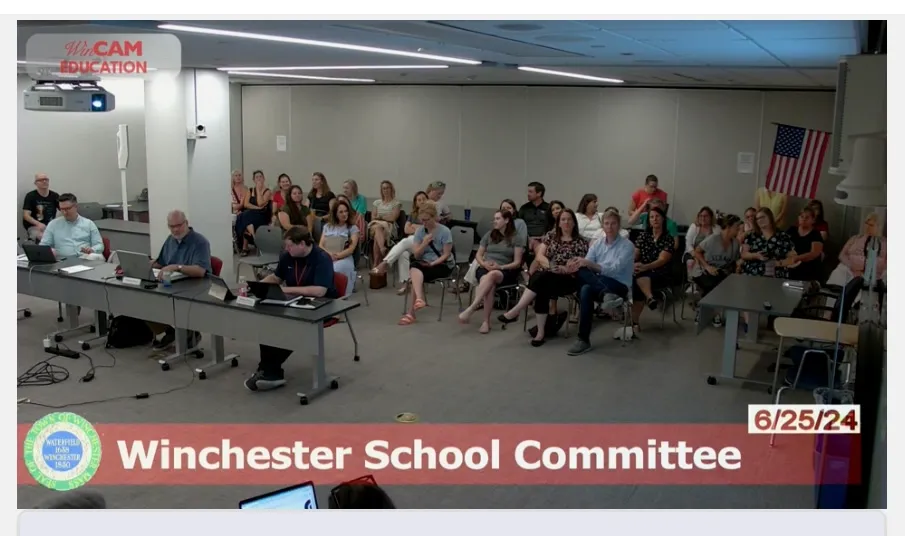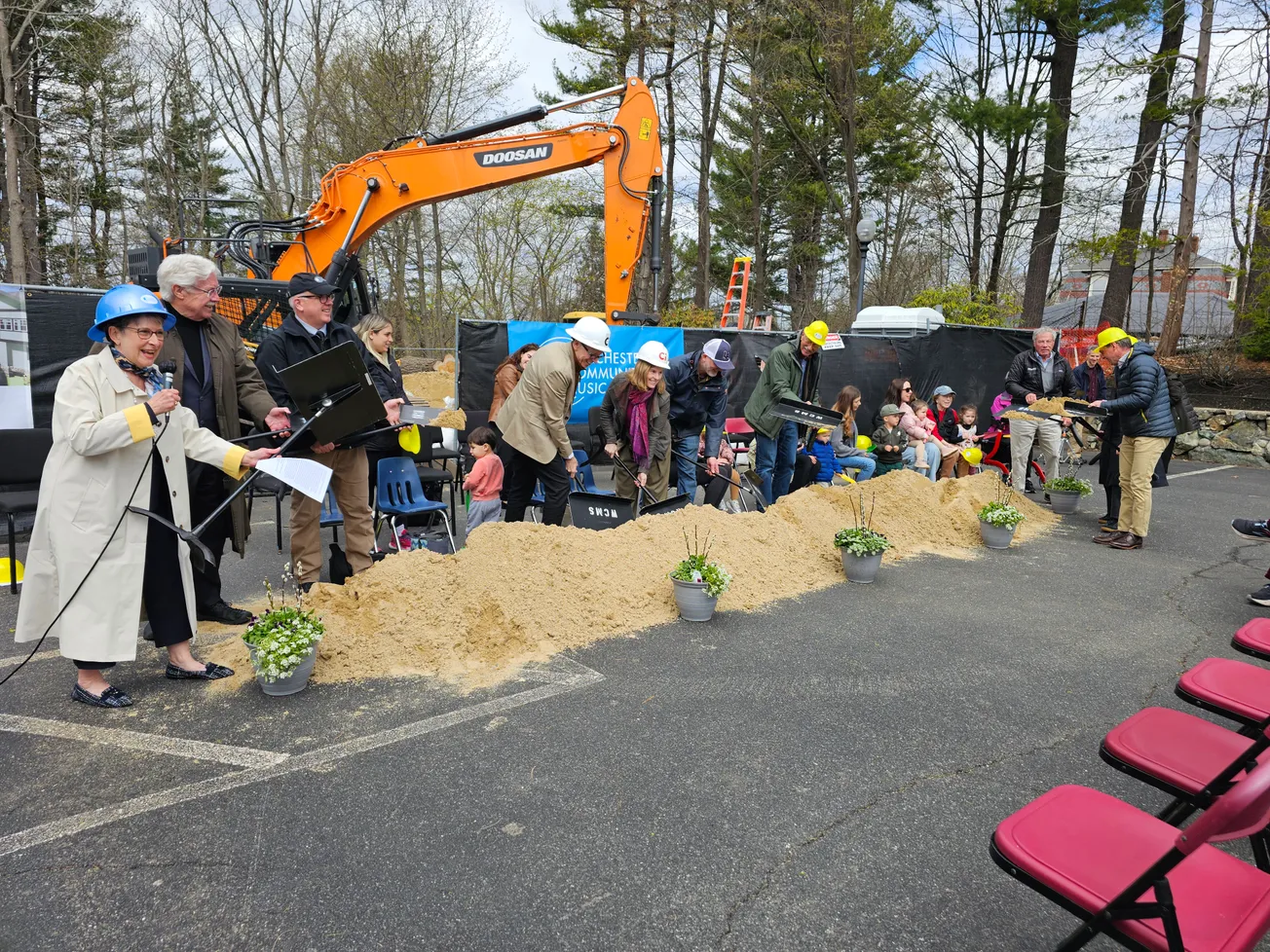Table of Contents
The Collaborative for Educational Services (CES) has presented its report on the state of early literacy in Winchester public schools.
Commissioned by Superintendent Dr. Frank Hackett in response to pressure from parents, the report is the culmination of months of meetings, surveys and interviews — and it paints a stark picture of the lack of guidance and support provided to students, families and teachers by district leadership.
The evaluation was conducted by team members from CES in collaboration with a “district design team” made up of Winchester parents, teachers, literacy specialists and administrators.
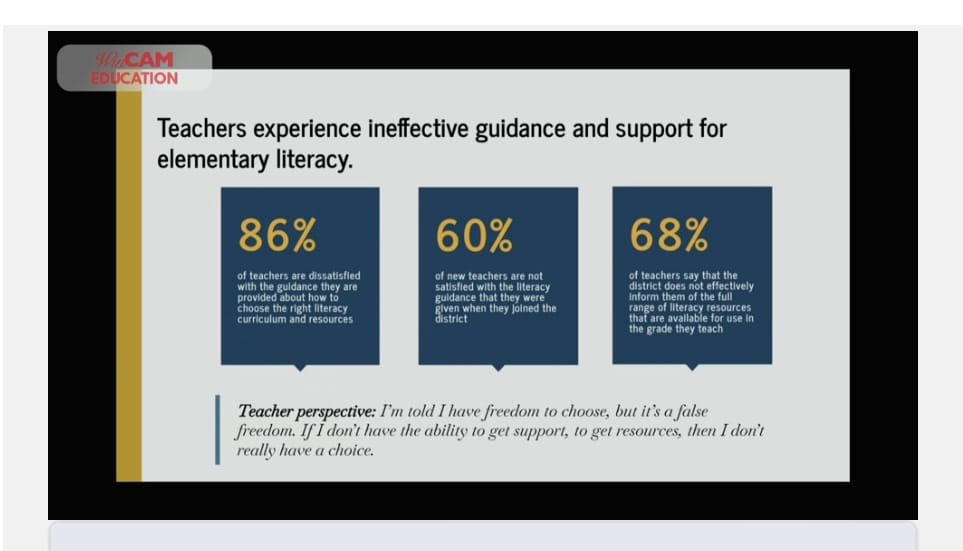
According to the report, which was released on June 24, the study “focused primarily on general classroom instruction & supplementary support” and did not include evaluating special education services. Nor did it “evaluate or recommend any specific solutions, literacy approaches, curriculum or assessments [on] any individuals, schools or classrooms.”
The purpose of the study was “to understand the conditions that enable or constrain the elementary literacy program in Winchester, and to understand the experiences of educators and families in the district as they relate to elementary literacy.”
According to the report, 187 (97%) elementary teachers provided survey responses; all 15 of the elementary literacy specialists responded; and 529 survey responses came from parents and caregivers, accounting for 37% of the 1,436 households invited to participate.
The report noted that although “the elementary literacy program in Winchester has several strengths and assets,” teachers and parents desire more structure and support throughout the district, noting that “educators and families who participated in our study — with near unanimity — strongly expressed their hope and desire for meaningful change” in three main areas: Curricular Incoherence, Tiers of Support and District-level Leadership.
Below are summaries of each of those “key takeaway” areas, pulled directly from the report:
Curricular Incoherence
“In Winchester, there is wide variability in the curriculum and materials used for elementary literacy across grades and across schools. In the experience of educators and families, this is creating programmatic incoherence that educators say impedes planning, communication, coordination, and instruction that is aligned across grades and schools.
“They also reported that these challenges are exacerbated because they experience a lack of effective communication and guidance from district leaders, and they feel that they do not have opportunities to access shared, high-quality professional development for literacy instruction.
“Parents expressed similar concerns about these issues, which stem from the experiences of their children who have struggled with literacy, including observing foundational gaps in their literacy development.
“Educators and parents want the district to support and facilitate high-quality professional development (PD) aligned with recent research, as well as greater curricular consistency, particularly in the form of evidence-based curricula that would provide students with a strong foundation of instruction in all areas of literacy, while maintaining flexibility for teachers to be responsive to student needs.”
Tiers of Support
“Winchester does not appear to have clearly defined tiers of intervention and support, such as response to intervention (RTI) or multi-tiered system of supports (MTSS).
“The district’s analogue to those structures is the Early Reading Support Program (ERSP), a set of grade-dependent assessments that can indicate a child’s eligibility for support, and a department of literacy specialists who primarily (though not exclusively) support struggling K-2 children.
“Teachers reported that in their experience, the structures that would allow children to get additional support can often feel unclear, insufficient, or underdeveloped.
“This was especially true in upper elementary grades. Families of children who struggle with literacy similarly expressed confusion and frustration with the current system of identifying students and providing additional literacy support.
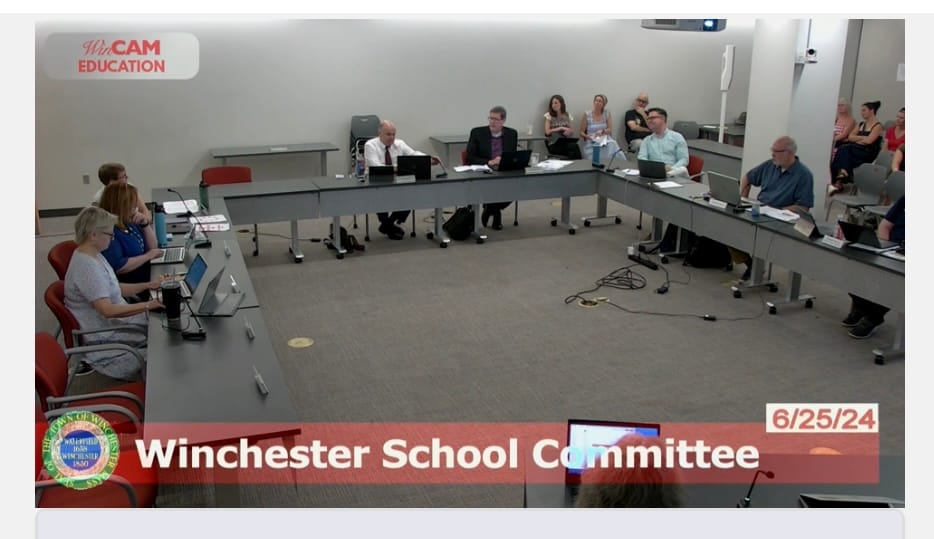
“Educators and parents both experience a lack of clear information and procedures, and have described what they see as a burdensome ‘wait-and-see’ approach that delays help for children who need it.
“Notable improvements to this system appear to have been made with the advent of Dynamic Indicators of Basic Early Literacy Skills (DIBELS) testing within the last two to three years. However, educators and families still expressed a strong desire for added structures and clarity around tiers of support — while maintaining flexibility for literacy specialists to be responsive to student needs.”
District-level Leadership
“Our study found that there is a gulf between the district’s description of the literacy program and teachers’ perception of it. Nowhere was this more pronounced than in the area of climate; in contrast to the district’s messages of trust in them, educators feel unheard, distrusted, and disempowered.
“There is an overriding sense among the majority of teachers that their questions about literacy program features and leadership decisions are unwelcome and may result in censure or shame, and teachers feel there is very low tolerance for candid and open dialogue about literacy.
“Parents and caregivers echoed that they have had similar experiences with district leaders, where they felt that their long-standing concerns were dismissed, and that the challenging experiences of struggling students and families have been ignored. By and large, educators and parents are currently unable to put their trust in literacy leaders.
“We raise this finding as a key takeaway because of the centrality of relational culture to any organizational change process. Without remediation, current gaps in perception and trust between leaders and teachers are likely to impede any future improvements.”
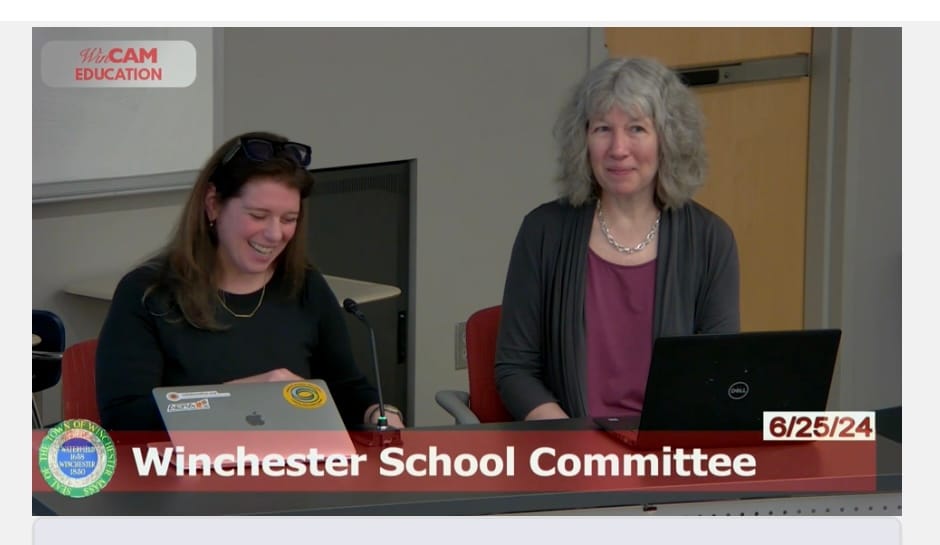
Explaining the findings
Catherine Brooks and Rebecca Mazur, PhD, of the Collaborative for Educational Services, elaborated more on the findings outlined in the report.
Mazur began the presentation by talking about curriculum, explaining the two most commonly used curricula in Winchester are UFLI Foundations, used primarily in kindergarten to grade three, and Units of Study in Reading, used mostly in grades three to five.
Mazur said that because teachers are given autonomy to choose exactly which curricula to use and how to utilize the literacy block during the day, there is significant variability among schools and classrooms in how literacy is taught and even the time spent on it. She added teachers desire a more uniform foundation from which to start teaching literacy.
“One thing we heard a lot from teachers is that within this condition of the expectation of autonomy and a lot of teacher choice, what they experience is ineffective guidance and support for the level of choice that they have,” she said. “Teachers talked a lot about feeling like they did not have enough support in knowing what to use, knowing what to choose to use in their classrooms and/or knowing what is even available for use- just a lot of confusion and sense of dissatisfaction with that. This exists across teachers of all schools and all lengths of tenure” but especially among newer teachers.
Mazur said teachers also reported a lack of widely shared best practices leading to an “incoherence” causing them to feel like they are “on their own” to teach literacy when they are “not experts in designing literacy curriculum."
Acknowledging that no one method will work for every student and that it is still critical for teachers to have autonomy or choice, Mazur explained teachers expressed a desire for a “firmer foundation of shared practice” to start from.
She said they notably specified they do not want this foundation to be Units of Study, which they “perceive as the curriculum the district most strongly endorses and sponsors,” but which has been identified by the state and literacy experts as failing struggling student readers.
Brooks spoke about teacher views on professional development, noting that 90% of professional development in Winchester is led internally, primarily by district literacy specialists, and 10% through self-paced online instruction.
“We found that existing structures for professional learning are not meeting teacher needs,” she said. “We heard this on the surveys and in the listening sessions.”
Brooks added that “none of the literacy specialists… said that the district support is ‘mostly effective or very effective’ in helping them deepen and improve their own practice. Most of them said that the district does not provide the support they need to learn about relevant research and advancements in the field.”
“Eighty-one percent of teachers rated the district professional development as entirely or largely ineffective,” Brooks said. “What we heard over and over again is that the condition of only getting professional development internally was not meeting their needs. They really tied that to their rating of the professional development as being ineffective.”
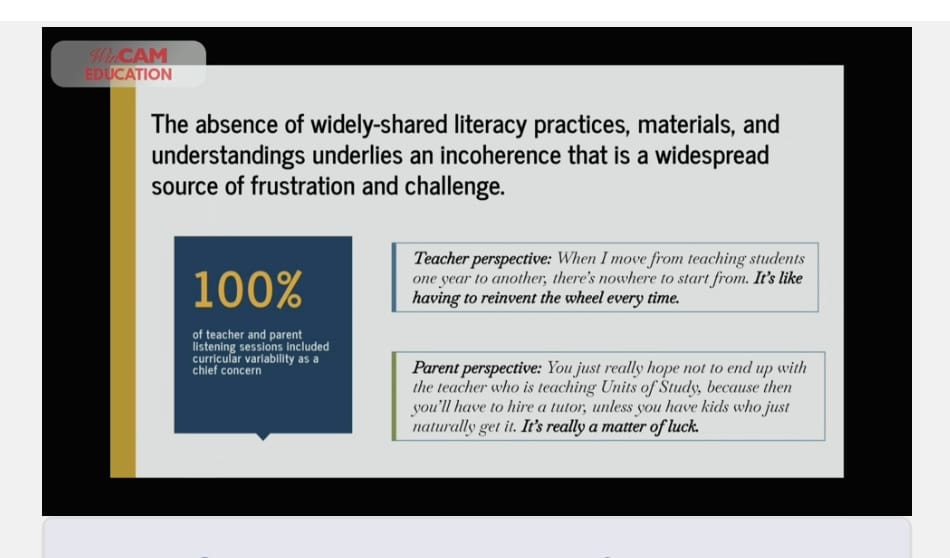
Mazur then spoke more about district-level leadership, saying, “what we heard is that teachers and parents both experienced really ineffective communication around literacy.”
Parents, she said, felt like “there was a lack of sufficient detail and ability to sort of make meaning of what the district’s approach to literacy is” while “teachers have some different understandings of the curriculum landscape” and feel “confused” about the curriculum and like they don’t have “clarity of information.”
According to one of the presentation slides, “teachers and parents perceive an approach to literacy leadership that is characterized by lack of respect, collaboration, and trust” with 88% of teachers reporting they “feel uncomfortable raising questions or disagreements about literacy with district leaders.”
Mazur noted that even literacy specialists who “are in a very unique position to get an overview of what’s going on particularly in the early grades” said “they don’t feel truly consulted, that they’re an untapped resource to some extent about what they know and what they can bring to the district in terms of what’s really happening and what decisions might be made.”
“[Parents] feel that there is an adversarial relationship that’s bred a larger culture of mistrust and suspicion,” Mazur said. “On the other hand, parents went out of their way to express that while they see systemic issues at work, they have strong respect and admiration for their children’s teachers.”
Further, she said teachers expressed a strong feeling of “collegiality” with their fellow teachers.
Relating to Tiers of Support, Brooks said there is a desire from both parents and teachers for more clarity and structure in identifying which kids need more literacy support and specialized instruction, even with the advent of DIBELS testing over the last couple of years.
Mazur concluded with more remarks about culture and how important it is to address it if there will be meaningful change moving forward.
“Parents and caregivers felt that their longstanding concerns had been dismissed at many levels,” she said. “This had really bred a condition where both parents and teachers felt like they couldn’t put their trust in the district. We raise this because it is so critical to a change management process.
“We want to end, though, on a note of opportunity,” she continued. “There are many key strengths to be leveraged, one being the commitment energy of people in this community around this issue to rebuild trust and move collaboratively forward. Many participants have come and shared, in many cases, tough stories and they have done so very explicitly with the spirit of hope and meaningful change and really wanting to partner in a new way of moving forward.”
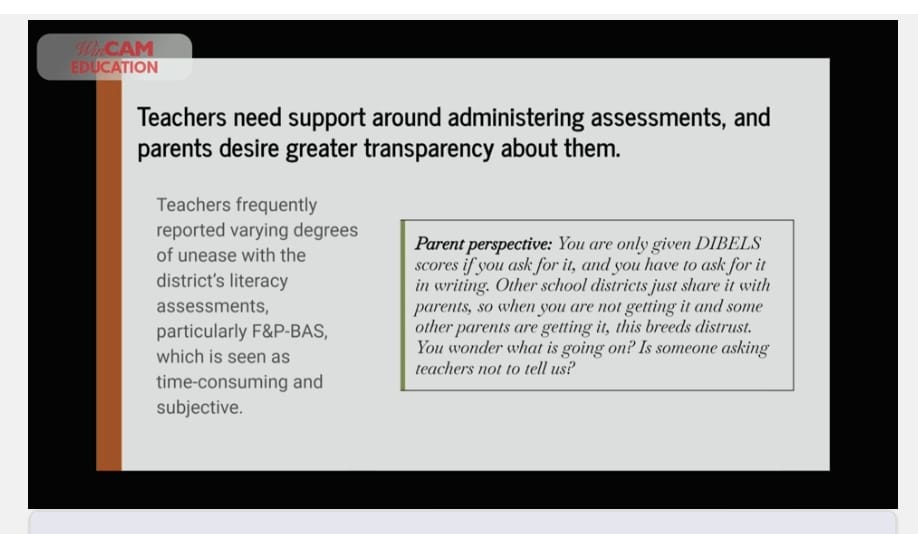
Community reaction
Backed by a crowd of attendees, including many Winchester teachers, several parents spoke during the public comment time of the School Committee meeting, grateful the report shed light on the issues they have been trying to raise for years, and pressing the School Committee to take meaningful corrective action.
Select Board member Anthea Brady began by saying she had read the report “and found that it lays out what a lot of families have suspected for many years.”
“I appreciate that it clearly articulates these concerns,” she said, “but I find it disturbing that it illustrates a systemic failure that tracks back for many years.”
She wanted to know how the district will address the issues, who is responsible for resolving them and “who will be accountable for getting the work done?”
Brady noted there are many resources available to make these types of changes, but that “it’s hard to implement best practices if there isn’t a buy-in and desire for change.”
“I hope that we’re ready for that change and can commit to moving forward to improve literacy for all students across the district,” she said.
Sarah Gannon, stating she had worked in literacy in Winchester for 18 years, explained she had met with Assistant Superintendent Dr. Jennifer Elineema four years ago about literacy issues her daughter was experiencing “with a well-documented timeline of her experience and the system failures she encountered, and your response was to thank me for my time and to never follow up.”
She also received a very “underwhelming” response when she brought these concerns to School Committee members over the years.
“It’s pretty clear there’s a problem and in order to create change, I think there needs to be leadership that has some mutual respect and trust,” Gannon said. “From that report, it was pretty clear that that’s not going to happen so I’m urging the School Committee to consider how they can move forward with the task at hand to address the issues that were addressed in the report.”
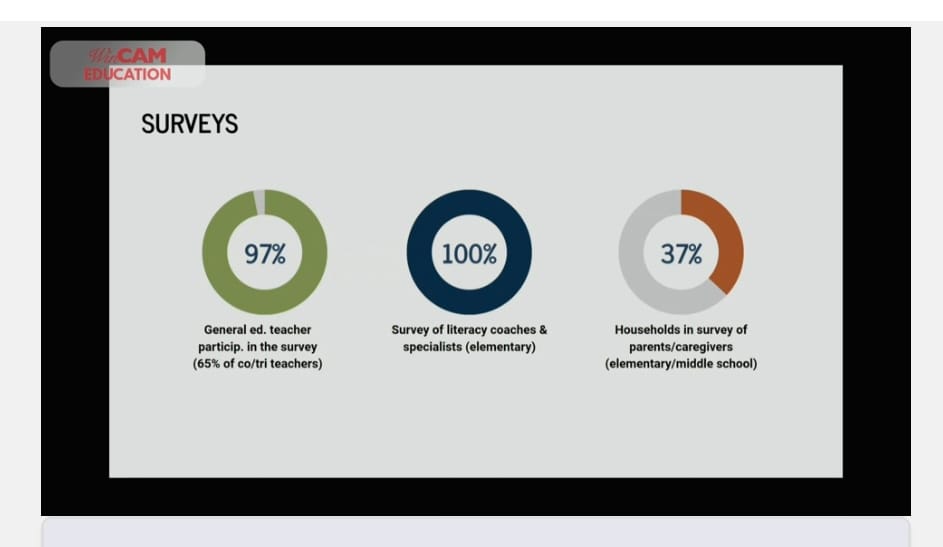
Nora Cooney thanked the superintendent and School Committee for conducting the literacy study and highlighted the need to dedicate more of the town’s financial resources to solving the issues identified.
“I think frankly this district isn’t spending enough on our schools and on our teachers, and on what they need and what our kids need, and we’re a very wealthy district and that’s not coming [through],” Cooney said. “We have a lot of money in this town and we need to start putting money where our mouth is, so to speak. And our teachers should not be bearing the burden of essentially creating curriculum on their own and doing a lot of work that frankly, I don’t think they’re being paid to do.”
Cooney urged parents to press the town to allocate more money to the schools, and also noted the School Committee would need to demonstrate to the town and to Finance Committee that it was doing everything it could to obtain grant funds from the state and elsewhere.
She acknowledged that because Winchester is a wealthy community, it probably wouldn’t receive these funds, but that it would demonstrate the need for more resources to make the needed changes.
Editor’s Note: This story has been updated to reflect the correct titles for Michelle Bergstrom and Rebecca Mazur.
Winchester News is a non-profit organization supported by our community. If you appreciate having local Winchester news, please donate to support our work, and subscribe to our weekly newsletter.

